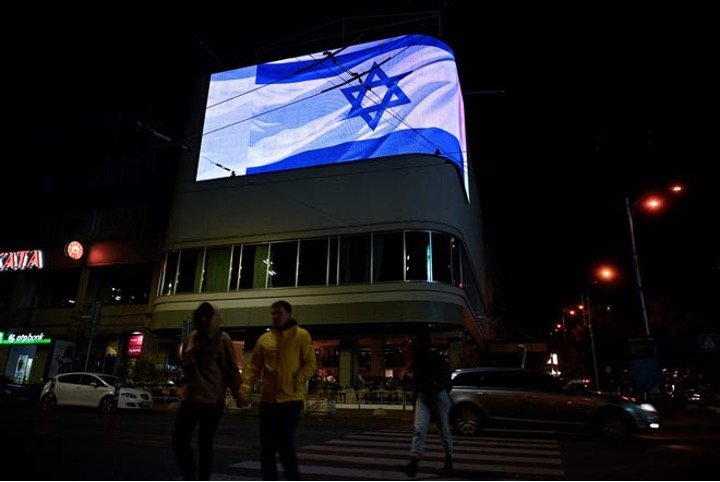Chanukah always occurs at the darkest time of the year (the new moon closest to the winter solstice) and this year, for sure, the world feels inescapably dark. We reel from the massacre of 1,200 Israelis, Hamas’s sadistic trickle of releasing hostages in exchange for convicted criminals, and all the tragedies of war.
Simultaneously, the Jewish community is thunderstruck by the surging antisemitism that we’re experiencing. On Tuesday, the presidents of three elite universities—Harvard, MIT, and the University of Pennsylvania—testified at a congressional hearing on the Jew-hatred that is raging on America’s elite college campuses. They were each asked if calling for the genocide of Jews constituted antisemitic hate speech and violate their schools’ code of conduct. Not one of those presidents had the courage to answer “yes.”
Self-evident are the disgraces of America’s college campuses, the aggressions that every Jew is experiencing on social media, and the hypocrisy of “progressives” who deserve no claim to the term—as the antisemitism of the far-left bends around backward so far that it kisses the far-right. When you say you believe that rape is always and forever a war crime—except when it is perpetuated by Hamas against Israelis—you forfeit your right to be called “progressive.”
The ripple effects of the war are broad, but here I want to address one in particular: the fearfulness of PDJs, “public displays of Jewishness.”
“Most people know about lighting the Menorah, but many forget that an essential aspect is to put the Menorah prominently where it can be seen, to announce to the world the miracle of the Maccabees long ago, and that miracles still happen today. ”
There are many reasons to be nervous. More and more Jewish institutions have been vandalized in the past few months with anti-Jewish slogans. In my suburban town, swastikas have found in both a middle school and the high school in the past few weeks. Every synagogue has a security guard or police officers keeping a carefully eye on Shabbat worshippers; in more densely populated communities, there’s a police car out front during Shabbat services.
(Still, it’s hardly as fearful as it has been for Jewish communities in Europe, who in many places have learned that in order to be tolerated by their neighbors they have to remain as innocuous as possible. If you intend visit a synagogue as a tourist in much of Europe these days, expect to tell them of your visit weeks in advance and to send ahead a copy of your passport; it is simply not safe in much of the world to pray as a Jew in a synagogue unannounced. No doubt your local sociology professor can explain why this is an aspect of an emerging social justice movement.)
What I hear from many of my students is an increasing fear of being recognizably Jewish in public. Some parents are telling their children—even in the tony suburbs of Massachusetts—to tuck in that chai or Jewish star before going out in public. I’ve even heard, with shock and sorrow, of children asking their parents to take down the Mezuzah from their front door. (Ironically, a Mezuzah case is often decorated with a biblical name of G-d, “Shaddai,” which is often interpreted as an acronym for shomer delatot yisrael, “Guardian of the Doorways of Israel.”)
I understand these fears, even while I chafe at them and push back. Chanukah couldn’t be timelier.
After all, the core of message of Chanukah is: when the world seems dark, have courage to assert yourself. This is found in the basic Mitzvah of lighting the Menorah:
נר חנוכה מניחו על פתח הסמוך לר"ה מבחוץ אם הבית פתוח לר"ה מניחו על פתחו
ואם יש חצר לפני הבית מניחו על פתח החצר, ואם היה דר בעליה שאין לו פתח פתוח לר"ה מניחו בחלון הסמוך לר"ה
ובשעת הסכנה שאינו רשאי לקיים המצוה מניחו על שלחנו ודיו
We place the Chanukah light at the entrance which faces the public domain, on the outside.
If the house opens to the public domain, place the Menorah at its entrance. If there is a courtyard in front of the house, place it at the entrance to the courtyard. If one lives on the upper floor, with no entrance to the public domain, one should place the Menorah in a window that faces the public domain.
In a time of danger, it is enough to place the Menorah on the table.
—Shulchan Arukh, Laws of Chanukah, 671:5
This is the central Mitzvah of Chanukah. Most people know about lighting the Menorah, but many forget that an essential aspect is to put the Menorah prominently where it can be seen, to announce to the world the miracle of the Maccabees long ago, and that miracles still happen today.
In other words, Chanukah is about proclaiming our identity without apology, even at a time when our instinct is to be more circumspect. Personally? I feel prouder than ever to be a Jew, as Israel fights a just war and as apologists for terrorism rip down posters of 5 year-old Jewish hostages in Gaza.
I realize that I write from a place of privilege. I really am in no danger, even at this time, in asserting my identity, but the same is not true for others. For instance, I realize that as a male, I don’t experience the vulnerabilities that women feel. Nonetheless, even with the caveats, I think this is a time like never before for Jewish self-assertion:
1. To wave those signs that say BRING THEM HOME or STAND WITH ISRAEL AGAINST TERRORISM or to wrap our trees and mailboxes with blue ribbons.
2. To represent as a Jew publicly, unafraid. (I wear a kippah all the time in public now—as much a celebration of my identity as it is an act of spiritual awareness of the omnipresence of the Shekhinah.)
3. And by all means, and most importantly, to put that Menorah in the window as its light increases day by day.
As Judah Maccabee might have instructed us: Let the world know we’re here, and we will not be cowed by those prefer their Jews quiet and quavering.
Let them know that we are committed to sharing the light of the season—and that we are, as we have always been, full-fledged partners in the work of freedom and justice and peace. But when hypocrisies and slanders are flung in our faces, or when they dissemble about dead Jews or consider Zionism to be racism, we will defend ourselves, and stand prouder for our values that go against the grain of the cultural conformist fashion.
Forwarded to you? You can sign up to receive these notifications via email: https://www.atreewithroots.org/contact












